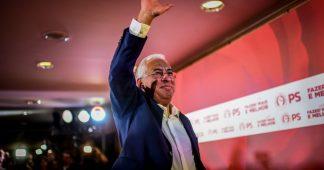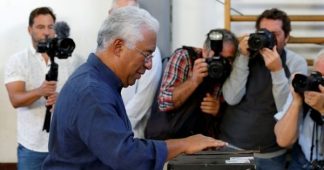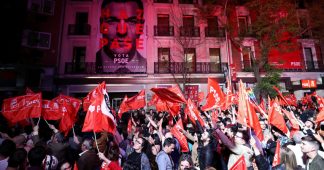By Joana Ramiro
01.24.2021
While his political affiliation lies with the center-right PSD, Rebelo de Sousa is a liberal populist best known for his many stunts — from driving a taxi around Lisbon during his mayoral campaign in 1989, to swimming to the rescue of two women whose kayak had capsized last summer. He’s been called the “King of Selfies” for the sheer number of photos he takes with fans; if not for the pandemic, he’d doubtless have been kissing every woman over sixty-five years old on the campaign trail.
It’s clear that by Monday, Rebelo de Sousa will be president for another five-year term: polls rate him close to 60 percent support. But that isn’t what these presidential elections are about. Rather, this is a poll on the rise of the far right — and a serious test for Portugal’s historic anti-fascist legacy.
The Rise of the Far Right
The last time Portugal went to the polls was in October 2019, when parliamentary elections shook the status quo. Established forces performed poorly. The center-left Socialist Party, in office since 2015, was only able to form a minority government with just over 36 percent of the votes. The Left’s overall vote share shrunk: the anti-capitalist Bloco de Esquerda (BE) just about held on to its nineteen seats in parliament, while the Communist/Green CDU coalition fell from seventeen to twelve. As for the center-right, both the PSD and the Christian-Democratic CDS were thrown into crises that both are yet to fully recover from.
All these parties have been around for twenty years more (the oldest, the Communist Party, was founded back in 1921). But new players fared well. The animal rights party PAN, which has only been running in elections since 2011, rose from one seat to four. And three new political forces were able to nab a seat each. One newcomer in the Assembleia da República is André Ventura, the first representative of a far-right party to be elected to parliament since the Revolution of 1974 overthrew Portugal’s decades-old dictatorship.
Ventura is the leader of the openly chauvinist Chega (meaning: Enough). Originally a local council member for PSD, Ventura realized around 2017 that his comments against Muslims and the Roma community garnered him more media attention than his party ever did. Bolstered by his growing popularity as a football commentator on Portugal’s most-watched cable channel, CMTV, Ventura launched Chega in spring 2019. By October, he’d been elected a member of parliament, securing a mainstream platform for his virulent far-right politics.
Not even four months into his role as an MP, Ventura announced he would be running for president. He found 10,250 signatories to his candidacy (Portuguese law demands a minimum of 7,500 backers) and spent the rest of 2020 showing as much face as he could. Throughout the pandemic, he barely stopped hosting political gatherings, rallies, and fundraising dinners. He was critical of all imposed lockdowns and restrictions, but he argued for a closing off of the border and strict curfews for “gipsies.”
When the Black Lives Matter movement brought tens of thousands of people to the streets across the country, Ventura hosted a “Portugal Is Not A Racist Country” counterdemonstration. Despite the slogan, he was photographed seemingly doing a Nazi salute. Month after month, thanks to political exposés, candid interviews, and a lot of fact-checking reportage, Ventura and his party got hours of screen time. And that was exactly what he wanted.
Chega is a party riddled with internal conflict. Held together by the cult of Ventura’s hackneyed personality, its supporters span from petty-bourgeois boomers squeezed by big capital as Portugal’s main cities are gentrified, to professed fascists with a criminal record. The presidential election campaign and its press coverage have given Ventura even more opportunities to speak to his acolytes, proposition other demographics, and prove to his funders that his project is here to stay. Chega is yet to truly galvanize a split in the ruling class and become a real fascist threat. But it’s much closer than any other party has been since 1974.
In less than two years, Chega has built strong links with evangelical lobbies, paired up with the international far right (hosting Marine Le Pen as a guest of honor on the campaign trail not two weeks ago), and built alliances with immensely wealthy elements of the Portuguese diaspora. It has also pushed the Christian-Democratic CDS further to the right, to a discourse far closer to the Catholic ultraconservatism that once ruled Portugal. For now, Portugal’s capitalist class sees little to no gain in Chega’s corporatist, isolationist rhetoric. But as neoliberalism totters, we can’t rule this out in future.
Presidency as Performance
The Portuguese president isn’t the equivalent of presidents in countries like the United States and Brazil — the role is, above all, ceremonial. They will preside over national events, host other heads of state, and officially appoint the prime minister.
But the last few years have also proven that the position has significant powers, within limits. When the 2015 general elections produced no straight winner, then-president Aníbal Cavaco Silva offered a PSD-CDS coalition to form a minority government — to the Left’s great annoyance, as it had to wait a few months to take power after the Right failed at the first hurdle. Then, in 2020, the role took special significance once more, as only the president can declare a state of emergency and approve lockdowns and curfews.
But the power of the presidency is, above all, rendered by the ebullience of its performance. No wonder, then, that a showman like Ventura, who lives by the motto of “bread and circus,” would bid for it. What is more, the gravitas of such an exhibition of authority suits Ventura’s fascistic inclinations to a T. That is why he copies — often verbatim — the rhetoric and style of the likes of Donald Trump and Jair Bolsonaro.
Playing against the King of Selfies, Ventura has no chance of overall victory. But he stands a rather better chance of beating the other contenders: the former Socialist diplomat Ana Gomes; the Communist Party’s youngest figurehead, João Ferreira; Bloco’s second-time candidate, Marisa Matias; the liberal drone Tiago Mayan Gonçalves, and a onetime Big Brother contestant named Tino de Rans.
The problem is not so much Gomes’s dry performance in debates or Ferreira’s mediocre social media presence, but rather that their offering stops at socioeconomic measures without appealing to a wider message of prosperity and hope. Their campaigns have lacked creativity and strength and have failed to make sonorous anti-fascist statements against Ventura or signal toward Portugal’s shameful past under a fascistic dictatorship. The only moment when you could sense a genuine grab of the collective imagination followed one of Ventura’s sorry initiatives.
Attempting to come across as the Portuguese Trump, Ventura has taken to pejoratively nicknaming political adversaries when rallying his supporters. Footage of him berating Bloco candidate Matias’s use of red lipstick went viral, as thousands of Portuguese people took to social media to protest Ventura’s vulgar misogyny. #VermelhoEmBelem, or “Red in Belém” (the name of the presidential palace), trended for days, with men and women alike painting their lips red on camera.
When Gomes shared a video of herself donning red lipstick, it signaled not only a sense of solidarity but also of anti-fascist euphoria. And, for that brief moment, it felt like the presidential elections had gained some dynamism and some real transformative power. People of both progressive and conservative persuasion were joining the hashtag, rejecting a reality where Ventura is part of the norm.
But this moment proved short-lived — and once the initial excitement on social media waned, things went back to the same old debates, with Ventura making preposterous propositions and the Left hammering him with logic. But logic alone won’t do.
The Left, already weakened by the variety of offerings, seems to have opted for a scrupulous but somewhat formulaic approach. The shortcomings of this strategy show in the polls. While front-runner Rebelo de Sousa is polling around 60 percent, center-left Gomes has remained bogged down in the low teens, challenged for second place by far-right Ventura. All other candidates fared lower than 5 percent.
While Portugal is a peaceful country, with an economy that benefited greatly from a timely mixture of state investment coupled with a tourism boom, there’s much to be changed and improved. Indeed, the pandemic has underscored how far Portugal still is from being a country with a strong public infrastructure, not to mention a fair redistribution of wealth. These are, in great part, things that are possible for parliament to change, and that the president neither has, nor should have, the power to directly influence. But Ventura has known all along that his pledges across the campaign serve less as concrete offerings than as placeholders for the politics he aims to normalize.
Anti-Fascist Defense
Given the long-presaged result, these elections felt like a missed opportunity for the Left to put forward an unequivocally anti-capitalist, anti-establishment program — a program that came out against problems still looming large in Portuguese society and that Ventura exploits so often for his own gain. Chega’s focus on corruption and social inequality, much like its appropriation of racist bigotry and misogyny, have not been conjured out of thin air. These issues have thrived in Portuguese society long before he came along.
The importance of these presidential elections goes far beyond the democratic duty of voting. They need to bring to life a historic legacy of anti-fascism. Those who left us that legacy, those who fought the dictatorship that Ventura so often praises and who hailed the advent of democracy in 1974, put forward an idea of Portugal as a socialist country. So much so that the Constitution still states in its very opening that the purpose of the Portuguese state is to “make way for a socialist society, respecting the wishes of the Portuguese people, taking into account the building of a freer, fairer, and more fraternal country.”
The vision our revolutionary forebearers laid out of socialism and prosperity, freedom and solidarity, needs to swiftly be reinjected into the messaging of the Portuguese left. It may be too late for the presidential candidates to reap the benefits of this shift, but it’s never too late if we are to truly end fascism
Published at www.jacobinmag.com











